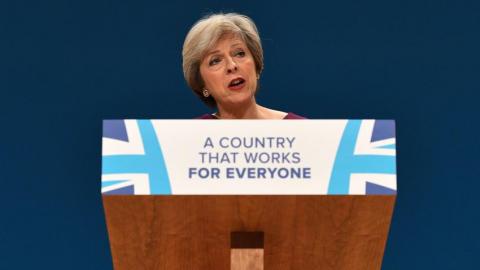Submitted by ICConline on
Divisions in the ranks of the capitalist class are natural for a class that competes at every level, from individual enterprises to inter-imperialist war. However, in the face of imperialist threat, economic difficulties or a resurgent class struggle, there is a tendency for the bourgeoisie to come together in the national interest. The decomposition of capitalism has pushed forward the tendency to division within the bourgeoisie, and in particular a tendency towards a loss of political control among the most experienced bourgeoisies.
The 2016 UK Referendum on membership of the EU produced a result against what the central factions of the British bourgeoisie considered as their best interests. The international populist tide was amplified with the election of President Trump. And the specific political difficulties of the British government were exacerbated by the general election of June 2017. Called to increase the Conservative government’s majority and strengthen its position in negotiations over British withdrawal from the EU, the election resulted in a loss of seats and the need to form an alliance with the DUP from Northern Ireland.
Far from improving the position of the British government and assisting in the EU negotiations, the loss of control is being shown in the plotting of various factions, divisions that go beyond those of Leave v Remain and Hard v Soft Brexit, and a general disarray within a ruling class that seems to have no coherent plans and is improvising at every turn. The British bourgeoisie faces real difficulties in the Brexit negotiations, yet appears to be unable to regain political control and at least try to get the best out of a difficult situation. The economic consequences of Brexit will be made worse by this political disarray.
The contrast between the historical strengths of the British bourgeoisie and its current situation is dramatic. The long term experience of the British bourgeoisie has meant that it has been able to unite in times of imperialist war, adapt in the face of economic crises, and adopt an appropriate strategy in the face of workers’ struggles. In 1974, in the middle of an open economic crisis and with a miners’ strike as the latest expression of a wave of workers’ militancy, an election was called which resulted in a Labour government that would be far more effective in dealing with the working class because of the extent of illusions in Labour and the unions. In the 1980s, while the Conservative government presided over attacks on the wages, jobs and conditions of the working class, Labour in opposition posed as the workers’ friend. Together with the unions, Labour presented alternative capitalist economic strategies and, in various ways, recuperated and/or diverted working class militancy.
In addition to the different ways that the British bourgeoisie have used the Labour Party against the working class, they have also handled well the differences within the ruling class. In 1990, the attitude of Prime Minister Margaret Thatcher towards Europe was deemed inappropriate in a period where the blocs dominated by the US and Russia were breaking up. The ‘men in grey suits’ had the previously unassailable Thatcher removed with very little fuss.
Today there are still manoeuvres going on within the British bourgeoisie, and specifically in the Conservative Party, but, far from leading to coherent policies or at least a dominant position by one faction, the strife within the ruling class shows every sign of growing. Britain was one of the countries worst hit by the economic blows of 2008, and the political unravelling within the Tory party is contributing to a further worsening of the situation.
The weaknesses of the bourgeoisie are not necessarily opportunities for the working class. The view of many leftists is summarised by the Socialist Workers Party when they say “The Tories are down but not out - we need to start kicking to bring them down” (Socialist Worker 4/7/17). They see the problems of the Conservative Party and declare that “We need resistance on a scale that can get rid of Theresa May and the rest of the Tory rabble”. (4/10/17). This is the prelude to a Labour government, although “A Corbyn-led government would not make Britain a socialist country. But millions will have been cheered by his pledges to tax the rich, renationalise industries and put more money into services.” (3/10/17). That is to say, many have illusions in Labour, and it’s one of the functions of leftism to reinforce illusions in this cornerstone of British state capitalism. Against this the working class need to understand that it is only through its own self-activity, through a growing consciousness that capitalism has nothing to offer, and an understanding that the working class is not just an exploited class but has the capacity to transform society, that the squabbles of the right and the lies of the left can be left behind. Car 21/10/17







 del.icio.us
del.icio.us Digg
Digg Newskicks
Newskicks Ping This!
Ping This! Favorite on Technorati
Favorite on Technorati Blinklist
Blinklist Furl
Furl Mister Wong
Mister Wong Mixx
Mixx Newsvine
Newsvine StumbleUpon
StumbleUpon Viadeo
Viadeo Icerocket
Icerocket Yahoo
Yahoo identi.ca
identi.ca Google+
Google+ Reddit
Reddit SlashDot
SlashDot Twitter
Twitter Box
Box Diigo
Diigo Facebook
Facebook Google
Google LinkedIn
LinkedIn MySpace
MySpace